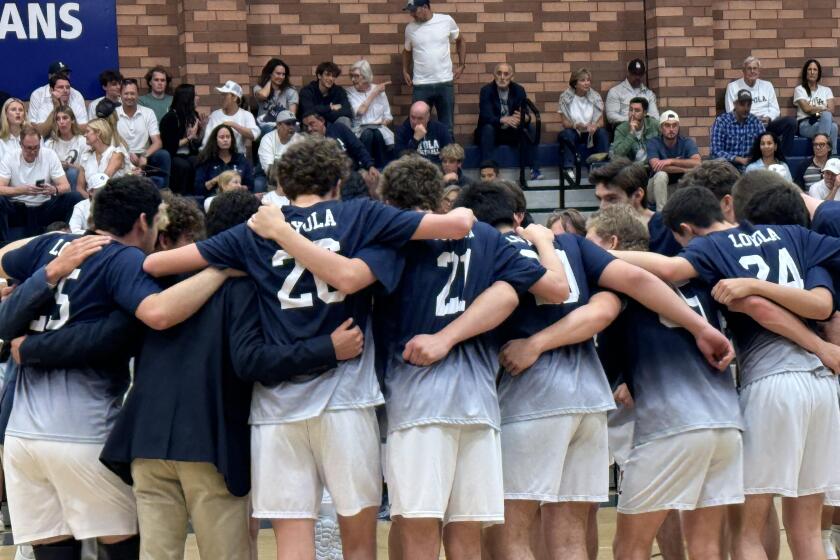CIF officials relieved at anti-recruiting ruling
If there were champagne bottles around the local CIF offices Thursday morning, corks would have been popped because the commissioners were in a celebratory mood.
“Yeah, baby!” Southern Section Commissioner Jim Staunton shouted.
“Thank goodness,” City Section Commissioner Barbara Fiege said.
Both were reacting to the 9-0 U.S. Supreme Court decision upholding state rules that forbid high school coaches from recruiting athletes while rejecting an argument that there is a free-speech right to ignore the rules of fair competition.
The decisive ruling upholds the status quo and prevents what could have been a chaotic development: allowing high school coaches to pursue eighth-graders as if they were college recruits.
Imagine the scene: Every high school sports program hires a recruiting coordinator who offers inducements such as free shoes or the promise of a personal meeting with the local college coach, to get a boy or girl athlete to enroll.
This case originated in Tennessee when the state organization penalized Brentwood Academy for sending out letters to eighth-grade boys inviting them to attend spring football practice.
Brentwood’s lawyers came up with an innovative but far-fetched free-speech argument that was rightfully rejected.
“The anti-recruiting rule strikes nowhere near the heart of the 1st Amendment,” Justice John Paul Stevens said.
In other words, if you want to join an organization, you have to play by its rules. The Supreme Court has validated the anti-recruiting rules of state organizations around the country, and that could empower state and local officials to crack down on those who think they can get away with cheating.
“I’m pleased we can put some reasonable limits on a coach’s influence on a student’s choice of schools,” Staunton said. “Undue influence rules would have been threatened across the country. This showed a recognition of our mission.”
The rules don’t prevent parents from choosing any school they want, private or public. But it needs to be their choice, and the focus has to be on academics first despite the increasing emphasis on sports.
School administrators and athletic directors are still permitted to talk with eighth-graders in Southern California about what their high schools can offer, whether it’s athletics, music or math programs. But coaches are barred from making direct contact for the purpose of convincing students to join their program.
It’s about trying to maintain a fair and equitable playing field even though the haves and have-nots are seemingly growing further apart. It’s about protecting young boys and girls from being used as pawns in recruiting wars that can become destructive and downright nasty.
Parents are now using athletics to choose specific high schools, and there’s nothing wrong in finding a school with an expert coach in football or basketball, just like picking a school with an award-winning drama program.
But schools were created to educate in reading, writing and arithmetic.
Extracurricular activities come later.
--
Eric Sondheimer can be reached at eric.sondheimer@latimes.com
Get our high school sports newsletter
Prep Rally is devoted to the SoCal high school sports experience, bringing you scores, stories and a behind-the-scenes look at what makes prep sports so popular.
You may occasionally receive promotional content from the Los Angeles Times.




